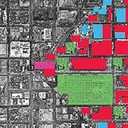22C3 - 2.2
22nd Chaos Communication Congress
Private Investigations
| Speakers | |
|---|---|

|
Meike Richter |
| Schedule | |
|---|---|
| Day | 4 |
| Room | Saal 2 |
| Start time | 13:00 |
| Duration | 01:00 |
| Info | |
| ID | 479 |
| Event type | Lecture |
| Track | Society |
| Language | English |
| Feedback | |
|---|---|
|
Did you attend this event? Give Feedback |
Fair Code
Free/Open Source Software and the Digital Divide

What has software to do with development policy? A lot. Software is not only about code, it is about rights, control, transparency, freedom and power.
Poorly educated people with little financial resources, mostly located in the Southern hemisphere, have little chance to have access to information and communication technologies (ICTs) and to the Internet. Since the mid-1990s, the so-called digital divide appeared on the political agenda. By providing access to ICTs, it is hoped to promote economical, political and social development as well.
This lecture explains the digital divide and its implications and gives an overview of the different positions within the discourse. There are three different modes of argumentation: the optimists claiming the new ICTs could strengthen the voice of the poor and developing nations and of marginalized groups; sceptics who believe that new technology alone will make little difference; and pessimists who emphasize that digital technologies will further exacerbate the existing North-South divide.
So far, the choice of the software model has hardly played a role in digital development policy. Proprietary architectures are the rule. Only in recent time, the nature of code becomes an issue. E.g., the country of Brazil is going pro-Linux. Free/Open Source Software has a lot of advantages for poor and developing nations: it offers access to knowledge and information engineering skills of the most developed countries, it promotes technological independence and it is for free. So how come that GNU/Linux is not being used all over the place? Why is Brazil's approach towards free code something completely new? This lecture explains why software becomes an increasingly important political issue.
